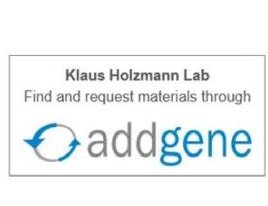Ao.Univ.-Prof. Dipl.-Ing. Dr. Klaus Holzmann
Gruppenleiter
T: +43 (0)1 40160-57530 (Office) oder +43 (0)1 40160-57535 (Labor)
klaus.holzmann@meduniwien.ac.at
ORCID: 0000-0003-4077-3377
Forschungsschwerpunkt
Der Schwerpunkt unserer Forschung liegt auf der Analyse von zwei wesentlichen Merkmalen von Tumoren, der Unsterblichkeit und der Signalübertragung von Wachstumsfaktoren.
Im Detail untersuchen wir die Telomererhaltungsmechanismen (TMMs) und den Signalweg des Fibroblasten-Wachstumsfaktor-Rezeptors (FGFR).
Unser Ziel ist es, den Mechanismus dahinter in verschiedenen Tumoren und entsprechenden Tumorzellmodellen menschlichen und tierischen Ursprungs (Mensch und Hund) zu charakterisieren und dieses Wissen in neue therapeutische Strategien oder Kombinationen mit etablierten zu übersetzen.
Ausgewählte Publikationen
Telomere transcripts act as tumor suppressor and are associated with favorable prognosis in colorectal cancer with low proliferating cell nuclear antigen expression
Kienzl P, Deloria AJ, Hunjadi M, Hadolt JM, Haering MF, Bothien A, Mejri D, Korkut-Demirbaş M, Sampl S, Weber G, Pirker C, Laengle S, Braunschmid T, Dragona E, Marian B, Gagos S, Lu L, Henson JD, Lau LMS, Reddel RR, Mikulits W, Stättner S, Holzmann K. Cell Oncol (Dordr). 2024 Sep 2. doi: 10.1007/s13402-024-00986-y. PMID: 39222177
Quantifying telomere transcripts as tool to improve risk assessment for genetic instability and genotoxicity
Sutterlüty H, Bargl M, Holzmann K.
Mutat Res Genet Toxicol Environ Mutagen. 2023 Oct;891:503690. doi: 10.1016/j.mrgentox.2023.503690. Epub 2023 Sep 9. PMID: 37770147
Alternative Lengthening of Telomeres Is Rare in Canine Histiocytic Sarcoma
Kreilmeier-Berger T, Aupperle-Lellbach H, Reifinger M, Hörstke NV, Holzmann K, Kleiter M. Cancers (Basel). 2023 Aug 22;15(17):4214. doi: 10.3390/cancers15174214. PMID: 37686490
Primary and hTERT-Transduced Mesothelioma-Associated Fibroblasts but Not Primary or hTERT-Transduced Mesothelial Cells Stimulate Growth of Human Mesothelioma Cells.
Ries A, Slany A, Pirker C, Mader JC, Mejri D, Mohr T, Schelch K, Flehberger D, Maach N, Hashim M, Hoda MA, Dome B, Krupitza G, Berger W, Gerner C, Holzmann K, Grusch M.
Cells. 2023 Aug 5;12(15):2006. doi: 10.3390/cells12152006. PMID: 37566084
Signal Transduction as an Assimilation of Signals with Different Origins and Different Intracellular States
Holzmann K, Sutterlüty H.
Int J Mol Sci. 2023 Jun 13;24(12):10085. doi: 10.3390/ijms241210085. PMID: 37373232
Impact of Bariatric Surgery on the Stability of the Genetic Material, Oxidation, and Repair of DNA and Telomere Lengths
Ferk F, Mišík M, Ernst B, Prager G, Bichler C, Mejri D, Gerner C, Bileck A, Kundi M, Langie S, Holzmann K, Knasmueller S.
Antioxidants (Basel). 2023 Mar 21;12(3):760. doi: 10.3390/antiox12030760. PMID: 36979008
Emerging Roles of Exosomes in Cancer for Possible Clinical Use.
Sutterlüty H, Holzmann K.
Cancers (Basel). 2022 Sep 22;14(19):4603. doi: 10.3390/cancers14194603. PMID: 36230526
The C-Circle Biomarker Is Secreted by Alternative-Lengthening-of-Telomeres Positive Cancer Cells inside Exosomes and Provides a Blood-Based Diagnostic for ALT Activity.
Chen YY, Dagg R, Zhang Y, Lee JHY, Lu R, Martin La Rotta N, Sampl S, Korkut-Demirbaş M, Holzmann K, Lau LMS, Reddel RR, Henson JD.
Cancers (Basel). 2021 Oct 26;13(21):5369. doi: 10.3390/cancers13215369. PMID: 34771533
Prevalence and potentially prognostic value of C-circles associated with alternative lengthening of telomeres in canine appendicular osteosarcoma
Bicanova L, Kreilmeier-Berger T, Reifinger M, Holzmann K, Kleiter M.
Vet Comp Oncol. 2020 Nov 19. doi: 10.1111/vco.12665. PMID: 33211388
Hot Spot TERT Promoter Mutations Are Rare in Sporadic Pancreatic Neuroendocrine Neoplasms and Associated with Telomere Length and Epigenetic Expression Patterns
Posch A, Hofer-Zeni S, Klieser E, Primavesi F, Naderlinger E, Brandstetter A, Filipits M, Urbas R, Swiercynski S, Jäger T, Winkelmann P, Kiesslich T, Lu L, Neureiter D, Stättner S, Holzmann K.
Cancers (Basel). 2020 Jun 19;12(6):E1625. doi: 10.3390/cancers12061625
Importance of Translational Research for Targeting Fibroblast Growth Factor Receptor Signaling in Cancer
Holzmann K, Marian B.
Cells. 2019 Oct 2;8(10):1191. doi: 10.3390/cells8101191.
Epigenetic Regulation of Telomere Maintenance for Therapeutic Interventions in Gliomas
Naderlinger E, Holzmann K.
Genes (Basel). 2017 May 17;8(5). pii: E145. doi: 10.3390/genes8050145.
Epithelial splicing regulatory protein 1 and 2 paralogues correlate with splice signatures and favorable outcome in human colorectal cancer
Deloria AJ, Höflmayer D, Kienzl P, Łopatecka1 J, Sampl S, Klimpfinger M, Braunschmid T, Bastian F, Lu L, Marian B, Stättner S, Holzmann K.
Oncotarget. 2016 Nov 8;7(45):73800-73816. doi: 10.18632/oncotarget.12070.
Alternative lengthening of telomeres does exist in various canine sarcomas
Kreilmeier T, Sampl S, Deloria AJ, Walter I, Reifinger M, Hauck M, Borst LB, Holzmann K, Kleiter M. Mol Carcinog. 2016 Sep 1. doi: 10.1002/mc.22546.
Telomere Transcripts Target Telomerase in Human Cancer Cells
Kreilmeier T, Mejri D, Hauck M, Kleiter M, Holzmann K.
Genes (Basel). 2016 Aug 16;7(8). pii: E46. doi: 10.3390/genes7080046.
LINE-1 induces hTERT and ensures telomere maintenance in tumour cell lines
Aschacher T, Wolf B, Enzmann F, Kienzl P, Messner B, Sampl S, Svoboda M, Mechtcheriakova D, Holzmann K, Bergmann M.
Oncogene. 2016 Jan 7;35(1):94-104. doi: 10.1038/onc.2015.65.
Differential effects of polymorphic alleles of FGF receptor 4 on colon cancer growth and metastasis
Heinzle C, Gsur A, Hunjadi M, Erdem Z, Gauglhofer C, Stättner S, Karner J, Klimpfinger M, Wrba F, Reti A, Hegedus B, Baierl A, Grasl-Kraupp B, Holzmann K, Grusch M, Berger W, Marian B.
Cancer Res. 2012 Nov 15;72(22):5767-77. doi: 10.1158/0008-5472.CAN-11-3654.
Expression of telomeres in astrocytoma WHO grade 2 to 4: TERRA level correlates with telomere length, telomerase activity, and advanced clinical grade
Sampl S, Pramhas S, Stern C, Preusser M, Marosi C, Holzmann K.
Transl Oncol. 2012 Feb;5(1):56-65.
The combined use of known antiviral reverse transcriptase inhibitors AZT and DDI induce anticancer effects at low concentrations
Aschacher T, Sampl S, Käser L, Bernhard D, Spittler A, Holzmann K, Bergmann M.
Neoplasia. 2012 Jan;14(1):44-53.
MNS16A tandem repeats minisatellite of human telomerase gene: a risk factor for colorectal cancer
Hofer P, Baierl A, Feik E, Führlinger G, Leeb G, Mach K, Holzmann K, Micksche M, Gsur A.
Carcinogenesis. 2011 Jun;32(6):866-71. doi: 10.1093/carcin/bgr053.
Alle Publikationen
Förderungen
- Fonds des Bürgermeisters der Bundeshauptstadt Wien
- Initiative Krebsforschung
- Jubiläumsfonds der Österreichischen Nationalbank
- Herzfelder'sche Familienstiftung
- Hochschuljubiläumsstiftung der Stadt Wien

